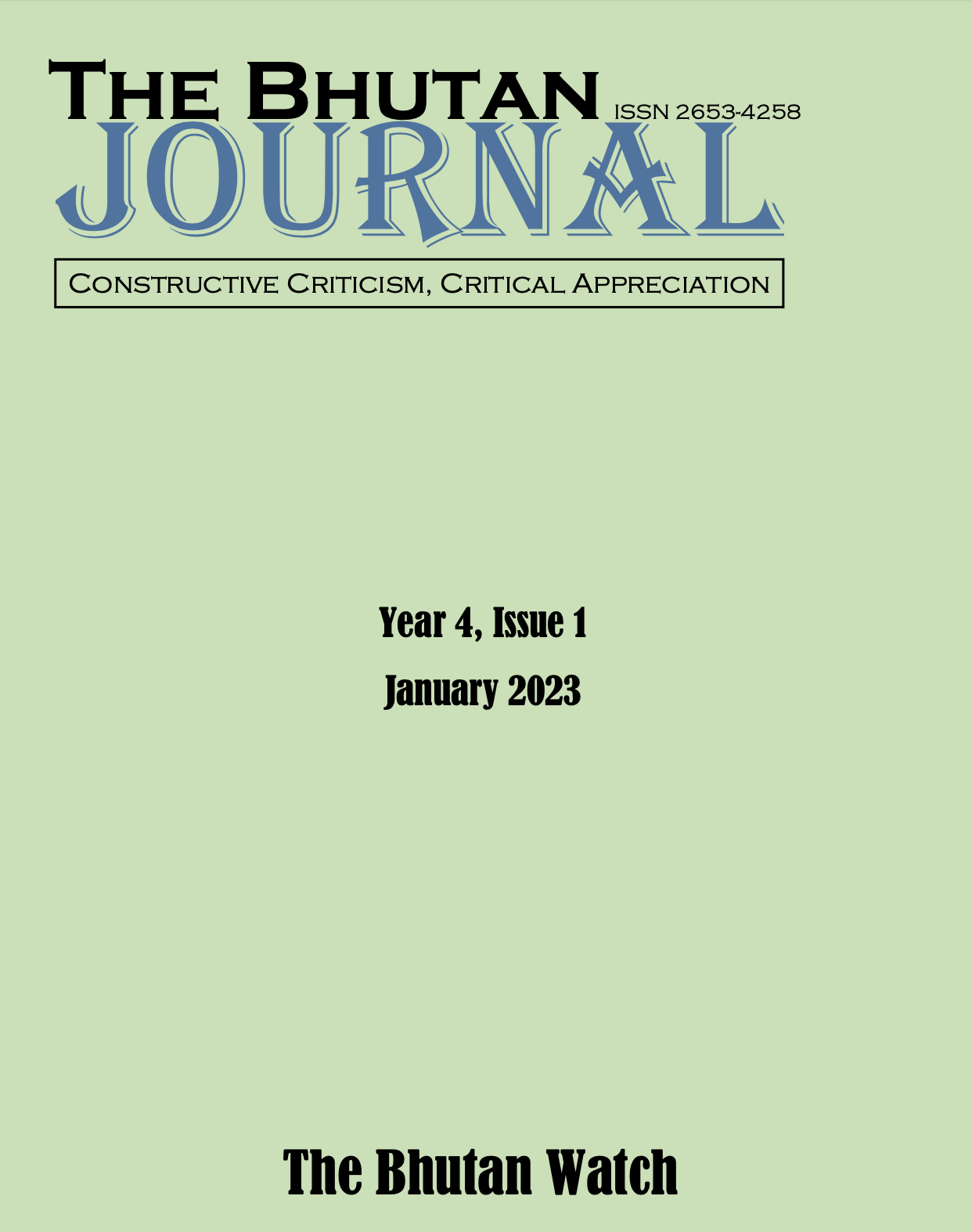Editorial
This issue of the Bhutan Journal has focused partly on language─ the most specifically the changing needs and status of the language of the Bhutanese diaspora. When the Royal Government of Bhutan wanted to reduce its potential political opposition, one of the major criteria in its target list was Nepali language and its users. The evicted people- who were mostly of Nepalese descent- reached Nepal where they reinvigorated their skills in Nepali language and literature that had almost extinguished in Bhutan. During their migration for resettlement, for many literate people, Nepali language or literature was the only possession they carried with them.
Citation: The Bhutan Watch. (2023). Editorial. The Bhutan Journal, 4(1); 1-3.
Identity, Culture, and National Interest: A Pragmatic Application of Constructivist Theory to the Lhotshampa Expulsion
By James Pleace
The Bhutanese state has constructed their identity, domestically and internationally, against the Lhotshampa people, a broadly Hindu Bhutanese-Nepali people, who feature as the ‘Other’ in the process of identity construction. This group of marginalised people has been expelled from Bhutan through ethnic cleansing. The monarchy and ruling elite see the Lhotshampa as a threat to their power and have imposed policies designed to homogenise Bhutan. We explore this Bhutanese construction of identity.
Citation: Pleace, J. (2023). Identity, Culture, and National Interest: A Pragmatic Application of Constructivist Theory to the Lhotshampa Expulsion. The Bhutan Journal, 4(1); 4-23.
Post-resettlement Bhutanese Poetry: A Thematic Content Analysis through Natural Language Processing
By Ramesh Gautam, Shiva Lal Dahal & Khem Raj Gautam
Interpretation of poetry is generally based on qualitative analysis of semantics, figurative language and expression, and knowledge about the author and literary elements. Recent advancements in computer-based text processing allow us to analyse a large amount of text quantitatively. This paper presents two useful aspects of literary analysis. Firstly, it interprets the social, cultural, and contemporary aspects of Bhutanese people’s lives after resettlement represented through poetry. Secondly, it presents NLP as a methodological technique in analysing literary texts written in the Nepali language.
Citation: Gautam, R., Dahal, S. & Gautam, K. (2023). Post-resettlement Bhutanese Poetry: A Thematic Content Analysis through Natural Language Processing. The Bhutan Journal, 4(1), 48-67.
Secular Aesthetics in Bhutanese-Nepali Poems
By Taralal Shrestha
This research attempts to explore secular aesthetics reflected in Punarwaspachhika Bhutani Nepali Kavita, an anthology of Nepali poems representing post-resettlement Bhutanese-Nepali literature published by Nepal Academy in 2022. Finding secular aesthetics in Bhutanese-Nepali literature is very rare. This qualitative research primarily explores secular aesthetics in the post-resettlement Bhutanese Nepali representative poems. The anthology has been assessed from the notion of hegemony and counter-hegemony and analysed their historicity.
Citation: Shrestha, T. (2023). Secular Aesthetics in Bhutanese-Nepali Poems. The Bhutan Journal, 4(1); 68-91.
Bhutan’s Employment Conundrum: Challenges and Opportunities
By I P Adhikari
The increasing unemployment, absence of government action in job creation, small market and lack of entrepreneurial opportunities are causing trouble to the Bhutanese population, especially youths, in recent years. The young and educated population is looking for greener pastures overseas and economy is surprisingly becoming remittance reliant. There are multiple factors within the country that needs government attention in order to improve the employment rate for university graduates. The country has such a small private sector that it hardly can create any new workplaces. The biggest employer is the public sector – that too is shrinking in recent years – in response to costs cutting measures. This study will focus on the historical structure of the Bhutanese job market, current trends and future prospects and what it means for the Bhutanese economy in general.
Citation: Adhikari, I. (2023). Bhutan’s Employment Conundrum: Challenges and Opportunities. The Bhutan Journal, 4(1); 92-106.
Keeping Activism Alive: Bishwanath
Bishwanath Chhetri (BNC) has been a leader of Bhutanese people since the conception of the Student Union of Bhutan (SUB) in 1988. He continued his activism in exile and the United States of America after the refugees were resettled in global north countries. He is actively involved in activities for preserving Bhutanese identity and history. He has inspired a generation of people with his words and actions.
Citation: Chhetri, B. (2023). Keeping activism alive: Bishwanath (Govinda Rizal, Interviewer). The Bhutan Journal, 4(1); 107-119.
